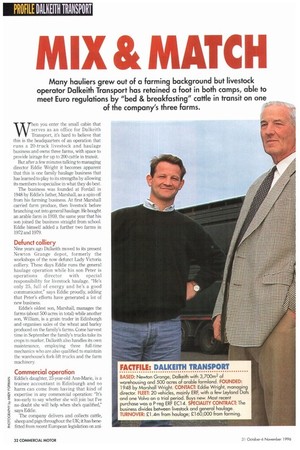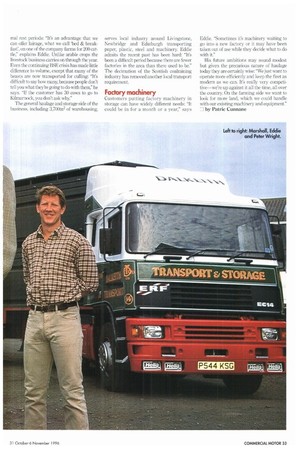MIX &MATCH
Page 34

Page 35

If you've noticed an error in this article please click here to report it so we can fix it.
N1711Then you enter the small cabin that serves as an office for Dalkeith Transport, it's hard to believe that this is the headquarters of an operation that runs a 20-truck livestock and haulage business and owns three farms, with space to provide lairage for up to 200 cattle in transit.
But after a few minutes talking to managing director Eddie Wright it becomes apparent that this is one family haulage business that has learned to play to its strengths by allowing its members to specialise in what they do best.
The business was founded at Fordall in 1948 by Eddie's father, Marshall, as a spin-off from his farming business. At first Marshall carried farm produce, then livestock before branching out into general haulage. He bought an arable farm in 1959, the same year that his son joined the business straight from school. Eddie himself added a further two farms in 1972 and 1979.
Defunct colliery
Nine years ago Dalkeith moved to its present Newton Grange depot, formerly the workshops of the now defunct Lady Victoria colliery. These days Eddie runs the general haulage operation while his son Peter is operations director with special responsibility for livestock haulage. "He's only 25, full of energy and he's a good communicator," says Eddie proudly, adding that Peter's efforts have generated a lot of new business.
Eddie's oldest son, Marshall, manages the farms (about 500 acres in total) while another son, William, is a grain trader in Edinburgh and organises sales of the wheat and barley produced on the family's farms. Come harvest time in September the family's trucks take its crops to market. Dalkeith also handles its own maintenance, employing three full-time mechanics who are also qualified to maintain the warehouse's fork-lift trucks and the farm machinery.
Commercial operation
Eddie's daughter, 23-year-old Ann-Marie, is a trainee accountant in Edinburgh and no harm can come from having that kind of expertise in any commercial operation: "It's too early to say whether she will join but I've no doubt she will help when she's qualified," says Eddie.
The company delivers and collects cattle, sheep and pigs throughout the UK; it has benefitted from recent European legislation on ani
mal rest periods: "It's an advantage that we can offer lairage, what we call 'bed & breakfast', on one of the company farms for 200 cattle," explains Eddie, Unlike arable crops the livestock business carries on through the year. Even the continuing ESE crisis has made little difference to volume, except that many of the beasts are now transported for cuffing: It's difficult to say how many, because people don't tell you what they're going to do with them," he says, "If the customer has 30 cows to go to Kilmarnock, you don't ask why."
The general haulage and storage side of the business, including 3,700m2 of warehousing,
serves local industry around Livingstone, Newbridge and Edinburgh transporting paper, plastic, steel and machinery. Eddie admits the recent past has been hard: "It's been a difficult period because there are fewer factories in the area than there used to be." The decimation of the Scottish coalmining industry has removed another local transport requirement.
Factory machinery
Customers putting factory machinery in storage can have widely different needs: "It could be in for a month or a year," says Eddie. "Sometimes it's machinery waiting to go into a new factory or it may have been taken out of use while they decide what to do with it" His future ambitions may sound modest but given the precarious nature of haulage today they are certainly wise: "We just want to operate more efficiently and keep the fleet as modern as we can. Ifs really very competitive—we're up against it all the time, all over the country. On the farming side we want to look for more land, which we could handle with our existing machinery and equipment."
by Patric Cunnane




































































































































